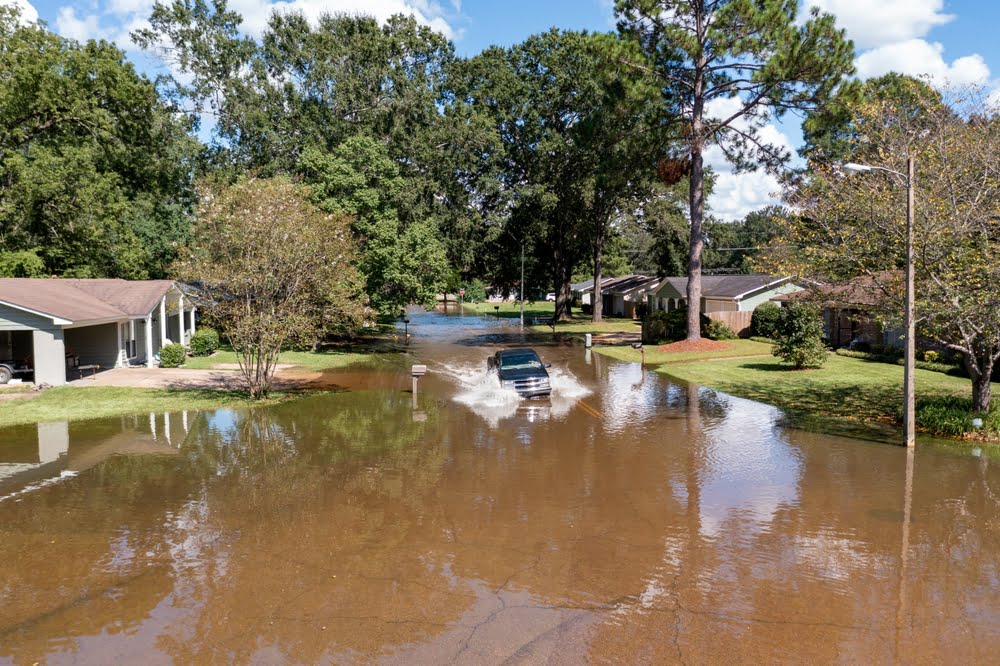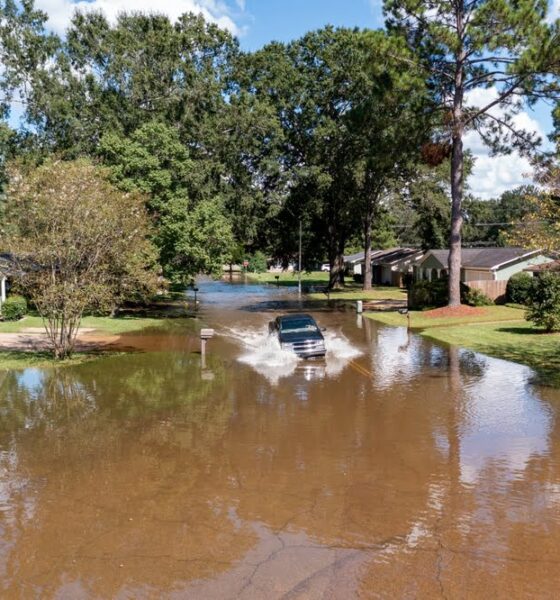

Environment
Jackson, MS Crisis Was Likely Caused by Climate Change
Sustainability is becoming a much more important concern as more communities struggle with water shortage concerns. A number of the problems communities are facing with record rains are caused by climate change. Jackson, Mississippi is one of the cities that has recently been hammered by historic rains that likely would not have happened without the growing threat of global warming.
Jackson, Mississippi is the Latest Victim of Climate Change Related Weather
Torrential historic rains and a water infrastructure in desperate need of repair was too much for the Mississippi capital of Jackson to withstand this week, as its 150,000 residents are left without any clean water to drink, and no water pressure for anything else.
This is just another example of how climate change is causing extreme weather events. More communities are likely to be affected in the coming months.
The city’s primary water treatment facility began buckling under the mounting pressure on Monday September 5, and by the following day, President Biden had issued an emergency declaration for the disaster, allowing for additional federal resources to help support officials in managing the crisis.
Also on Tuesday, White House press secretary, Karine Jean-Pierre, stated that the Federal Emergency Management Agency is ‘working closely with the state officials to identify needs, and the EPA is coordinating with industry partners to expedite delivery of critical treatment equipment for emergency repairs at the City of Jackson water treatment facilities.’
A disaster decades in the making
This water crisis, brought about by torrential rains that put Jackon’s already-struggling water treatment plant under unmanageable strain, is the latest in a string of water issues and crises faced by the city. Jackson residents had already been under a ‘boil water notice’ since late July – conditions all-too familiar to the majority-black community. The problems caused by climate change are just another problem that led to this fiasco.
In 2020, Jackson’s water system failed an Environmental Protection Agency (EPA) inspection. According to the agency’s report, the drinking water was vulnerable to parasites and harmful bacteria contaminants, having observed its turbidity (cloudiness).
Following that report , the EPA issued the city of Jackson with an order to develop a plan to repair (and where necessary, replace) water monitoring and treatment plant equipment, and to address inadequate disinfection procedures.
Then, a winter storm in February of 2021 caused the city’s water system to shut down for a month, leaving residents without water in the midst of the global pandemic; according to the Mississippi Rapid Response Coalition, Jackson residents were under a boil water notice for 225 days during 2021 alone.
Jackson Mayor, Chokwe Antar Lumumba, stated in a news conference addressing the water crisis, that ‘it was never a matter of if Jackson’s system would fail, but when it would happen.’ He also lamented that, ‘As one crisis may be diverted, another one rears its head.’
By July of 2021, the city of Jackson and the EPA had entered into an agreement regarding the necessary improvements for the water system, with the EPA announcing that almost $75 million would be allocated to Mississippi for federal water and sewer infrastructure funding.
While this represents some progress, Lumumba has stated that it would take closer to $2 billion to properly overhaul the system
This water crisis was inevitable given how drastically underfunded Jackson’s water structure has been over many years; a disaster many experts agree has been ‘decades in the making.’
Furthermore, with 82.5% of Jackson residents identifying as African American or Black, and the majority of Mississippi’s state legislature being White, much speculation is being directed towards environmental and systemic racism being at the root of the issue.
Relief efforts feel the strain
Following the plant’s failing, state officials announced that the National Guard had been called in to assist in distributing bottled drinking water to Jackson residents, while crews worked tirelessly in attempts to get the treatment plant back to working order.
Initial distribution efforts soon proved unsustainable as residents waited in mile-long cues for hours to receive one water bottle each, with the effort quickly drawing to a close once the 700 cases of water had run out.
Since then, help has been flooding in from far and wide, with 18-wheeler truckloads of water coming in from the City of Houston, 326,000 bottles of water from Amazon, and countless other donations from businesses across the nation. JUST Water, founded by actor Jaden Smith, sent 20 pallets of mountain spring water to Operation Good from its depot in NY, with CEO Will Holsworth commenting, “We are in a unique and qualified position to help, how could you possibly look the other way?”
Communities aren’t prepared
Jackson’s water crisis provides an alarming warning to other American communities, as water and stormwater infrastructure is evidently problematic across the nation, and the severity and frequency of major weather events are increasing all the time.
The American Society of Civil Engineers recently made their concerns known regarding the condition of the country’s drinking water infrastructure, stamping its latest report card with a telling C-minus.
According to the accompanying report, America’s ‘aging and underfunded’ system suffers water mains breaks every other minute, resulting in an estimated loss of 6 billion gallons of treated water every single day.
Furthermore, America’s stormwater infrastructure is reportedly no better. Engineers are warning that very few of the nation’s systems receive sufficient funding to make the improvements required to successfully manage the increased flooding events that will inevitably occur as long as the climate change crisis continues.
Sustainable drainage
Not only is the current infrastructure in desperate need of repair and funding, but a considerable redesign effort is seemingly required to significantly reduce flood damage. Researchers are finding that the current drainage pipes and other water infrastructure are becoming increasingly inadequate in the face of the ever-heightening precipitation volumes and storm severity.
Urban environments suffer increased flooding damage due to their larger impermeable surface areas, such as paving, buildings, and (vehicle) soil compaction. When water has limited soil to infiltrate, there is an increase in runoffs, resulting in overflowing waterway and sewers.
Sustainable Drainage Systems are designed to manage surface water and subsequent flooding and drainage by mimicking the natural cycle of water as best as possible. By slowing down runoffs and establishing more areas capable of handling natural in-ground water infiltration, damage resulting from significant rain events can be minimized.
Jackson is Hit Hard as Climate Change Creates More Flooding Risks
Climate change is increasing the number and severity of flooding and other weather events around the world, dramatically affecting the health and livelihoods of many communities. Countries causing pollution are driving more coastal flooding around the world. There are many fundamental issues to address, such as environmental racism, and the need for ever-more sustainable infrastructure developments.
You can help the people of Jackson by following this link.


 Environment12 months ago
Environment12 months agoAre Polymer Banknotes: an Eco-Friendly Trend or a Groundswell?

 Features11 months ago
Features11 months agoEco-Friendly Cryptocurrencies: Sustainable Investment Choices

 Features12 months ago
Features12 months agoEco-Friendly Crypto Traders Must Find the Right Exchange

 Energy11 months ago
Energy11 months agoThe Growing Role of Solar Panels in Ireland’s Energy Future





























